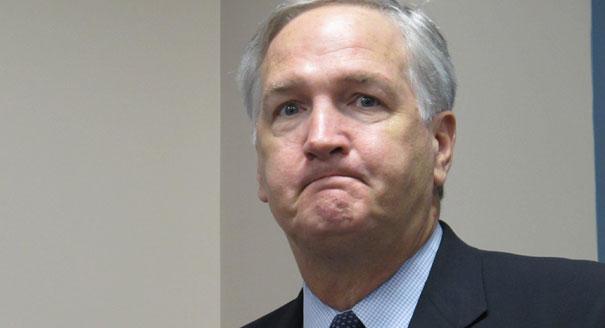
Luther Strange
Of all the public statements about the recent U.S. Supreme Court ruling on the Voting Rights Act (VRA), perhaps the most ironic belongs to Alabama Attorney General Luther Strange.That's because Strange praised the high court's decision to gut VRA at the same time he was being sued under VRA.
It's hard to imagine a more flagrant display of hypocrisy from a public official. But given what we are learning about Strange's personal life, perhaps we should not be surprised at anything he might say or do.
This is the same Luther Strange who argued back in January that the VictoryLand casino should not be granted a liquor license because the facility and its owner, Milton McGregor, have "a sordid past."
Based on our roughly three-month investigation of Strange's personal affairs, we can safely say that Strange knows a thing or two about sordid activities. We will be providing details in a multi-part series of posts that begins this week.
The public already has plenty of evidence about Strange's tendency to make deceptive public statements that are hypocritical and, at times, downright dishonest. Consider his words on the Supreme Court's ruling on the VRA in Shelby County v. Holder. This is from an NPR report titled "In Alabama, Voting Decision Seen As A Sign of Progress, Setback":
The 5-4 decision declared unconstitutional a section of the law that established a formula to identify state and local governments that were required to get approval from the federal government before they made changes to their voting laws. The Supreme Court said Congress can change that part of the law — Section 4 — to reflect "current conditions" if it wants to continue to enforce it.
Luther Strange, Alabama's Republican attorney general, calls the ruling historic.
"What I'm most pleased about [is] it's a recognition of the tremendous amount of progress that we've made in Alabama over the last 50 years," he says.
Strange did not stop there. From NPR:
Strange says there's no doubt that federal oversight was needed in the 1960s. But times have changed.
"To treat Alabama the way all the other states are treated is a huge victory — symbolically, I think, and practically," he says.
"Big Luther" apparently neglected to mention one tiny detail: At the time he spoke those words, he was the defendant in a federal lawsuit under the Voting Rights Act.
In a case styled Johnny Ford, et al v. Luther Strange, et al, the mayor of Tuskegee and other residents of Macon County allege that Strange and Governor Robert Bentley violated the Voting Rights Act by usurping the authority of the county sheriff when Strange's office raided and closed the VictoryLand casino in February.
Plaintiffs' lawyer Donald LaRoche, of Brockton, Massachusetts, alleges that racism and thuggish Republican Party politics drove the VictoryLand raid, which heaped "economic devastation" upon residents of majority-black Macon County. From the complaint:
Beginning in 2003, white political leaders of the Alabama and National Republican Party . . . , including but not limited to Governor Bob Riley, initiated plans to elect white Republicans to the Executive, Legislative, and Judicial branches of government in the State of Alabama, allegedly referred to as "Operation 2010."
In order to raise funds to accomplish their goal, Alabama Republican leaders and elected officials entered into a scheme with the Mississippi Choctaw Indians Casino Operators . . . and later the Alabama Poarch Band of Creek Indian Casino Operators. . . .
This scheme included eliminating competition to Indian Gaming from non-Indian Gaming, including "VictoryLand" located in Macon County, Alabama. Eliminating VictoryLand served the dual goals of both by providing Indian Gaming a monopoly in Alabama and shutting off potential non-Indian Gaming . . . contributions that Republican political leaders feared could be used to thwart their political plans.
Strange, of course, is a card-carrying member of the Bob Riley machine, via mutual ties to the Birmingham law firm Bradley Arant. Machine members consistently have claimed they oppose gambling, in all forms, on a moral basis. We already have shown that one machine member, the former governor's son Rob Riley, has feet of clay when it comes to issues of private morals.
We are about to show the same thing regarding Luther Strange.
(To be continued)